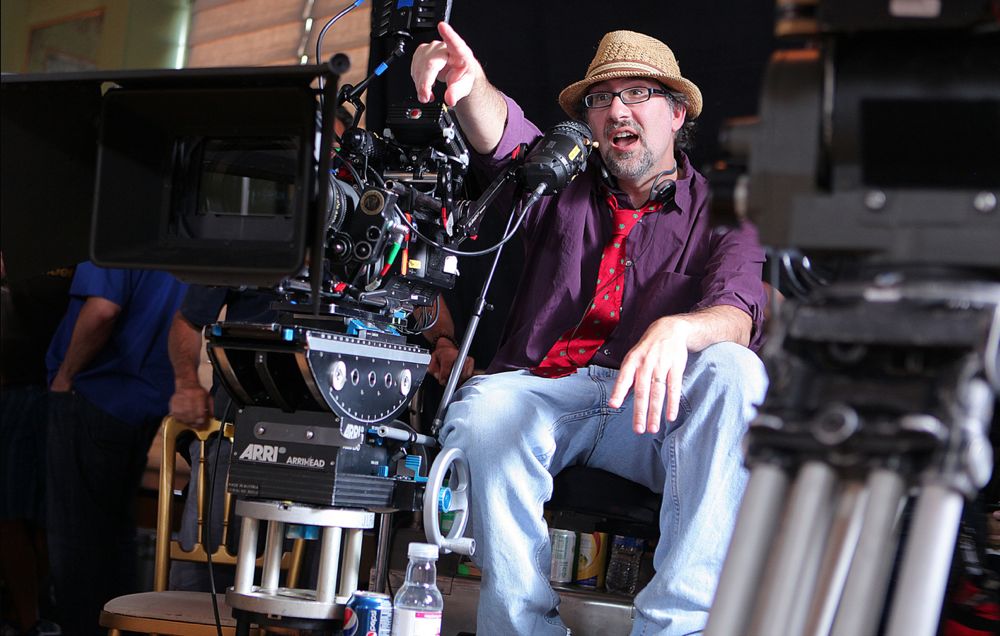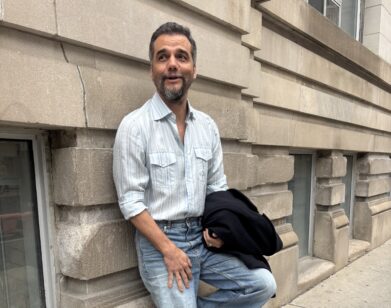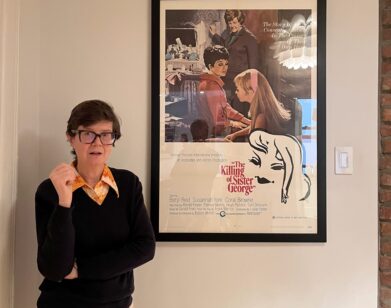Springtime for Dan Mirvish

ABOVE: DAN MIRVISH ON THE SET OF BETWEEN US. PHOTO COURTESY OF BUGEATER FILMED ENTERTAINMENT, LCC.
Two couples meet at a McMansion in the Midwest. The men are—or were—friends from grad school. Joel (David Harbour) is a successful ad man with a WASP-y wife, Sheryl (Melissa George), and a new baby. Carlo (Taye Diggs) is a struggling but hopeful photographer in New York; his girlfriend Grace (Julia Stiles) an aspiring social worker. It is quickly apparent, however, that this is not going to be a joyous reunion dinner. Joel and Sheryl are fighting—taking not-so-subtle potshots at one another. Grace and Carlo are highly uncomfortable and increasingly resentful of their friends for making them feel that way. They reassure themselves that their relationship will never deteriorate to such an extent. Things escalate, and you wonder if someone might get physically hurt.
In case you hadn’t guessed from the extreme tension and minimal cast size, Between Us began as an Off-Broadway by Joe Hortua in 2004. The transition from stage to screen was not an easy one. After director Dan Mirvish approached Hortua to adapt the script, there were a few false starts and wavering funds. If you know anything about Mirvish, however, you know that he is a cheerfully tenacious and determined character. The co-founder of Slamdance and a former political speechwriter, Mirvish’s last feature Open House (2004) was distributed as “the film that changed the rules of the Academy Awards.” More on that later.
EMMA BROWN: Do you think that Between Us is a pessimistic film?
DAN MIRVISH: Well, it’s certainly a downer for a lot of it. Seeing it with audiences in these different countries at these different festivals, it actually gets quite a lot of laughs—more than I would have expected. The one kind of optimistic thing is the Joel and Sheryl characters. When we first meet them, they are on the verge of splitting up, and yet, two years later, through luck and happenstance, they are back together again. There are obviously still strains in the relationship, but they can still come back from the brink. I think that shows some optimism—no matter how bad a relationship can be, especially when you go through a traumatic experience, [it] can completely alter the relationship, or has the potential to do that. Now the other couple, maybe not so much. Without ruining the ending for people, there is this interesting reversal; there is no great silver lining in that relationship. I wouldn’t say it’s a pessimistic movie, but it’s not wildly optimistic either.
BROWN: I definitely had a sense of, “All relationships are doomed; never get married,” after watching it.
MIRVISH: Yeah, sorry about that. But I wouldn’t worry about it—I’m sure your relationship is much better! I know my relationship is much better than that. I know that Joe, the playwright, has a great marriage. These are not autobiographical. I like to say it’s a dark comedy in the sense that you can laugh at these people because their relationships are going to be so much worse than anything in your own life—hopefully. Hopefully we can have a little schadenfreude about them and say, “See, we are doing so much better than these guys.”
BROWN: By the time we meet Joel and Carlo, they seem to have grown so far apart. When were they last really friends?
MIRVISH: I think it was when they were in grad school. But I think with grad school, there is always this competitive edge. No matter how close friends you are with someone—no matter if it’s film school, or playwriting school, or journalism school—you’re always ultra-competitive with your best friend. I think we touch on some of that in the movie.
BROWN: And on how painful it can be to end a friendship—or to know when to end it.
MIRVISH: Yeah, exactly. There are a lot of friendships that should be ended sooner than they do. Maybe that’s the case here— maybe these guys shouldn’t still be friends, they should have just gone their separate ways and they didn’t. I can certainly relate to it. I have friends from film school that are wildly successful in Hollywood. On the other hand, they are jealous of me because I get to make fun, independent films. And then there are other people who haven’t done anything. There is this very minor character in the movie that you really don’t even see, but he’s talked about once—they mention, “Oh Lucy and Mark said you had a baby.” That was more back-story for the actors—no one would ever notice this watching the movie—that, at the end of the day, the one guy who has a healthy, happy relationship and is happy in his job, is the guy who became a wedding photographer. What you would think of as the lowest rung of photography is actually the happiest guy who is the most gainfully employed on a regular basis and gets to work with his wife.
BROWN: Can you tell me a little bit about how you first came across the play?
MIRVISH: I did a movie a few years ago that was called Open House, which was a real estate musical, and there is a whole crazy story about how we did an Oscar campaign with that.
BROWN: Where they changed the rules of a category because of one of your films?
MIRVISH: Yeah, it’s a fun little side story. We had made this movie, it had been to plenty of festivals and distributors saw it and they liked it, but they didn’t want to pick it up. I was in a limbo that a lot of filmmakers find themselves in. I got a call from my friend who is an acquisitions executive at Miramax, and I thought, Oh terrific, she’s calling to pick up the film, and she said “No, there is no way in hell we are picking up the film.” So I said, “Why are you calling?” And she said, “Have you heard about this Oscar category called Best Original Musical? It really is a category that the Academy has just never activated. The rules say that, if in any given year there are five truly original musicals (submitted), then they activate the category, three of them get nominated, and one of them wins.” And I thought, just getting an Oscar nomination—forget about winning, just the nomination —will guarantee that I get distribution for the film. The catch was that there were these very arcane rules about what qualifies as an original musical: it couldn’t be based on a stage play, so Chicago wasn’t counted. It can’t have unoriginal music, so Moulin Rouge wasn’t counted. It had to have at least five original songs. The songs have to tell the story of the movie. It has to have the same songwriting people.
Miramax had two films they thought would be eligible, and they were looking for a couple patsies like me to fill out the category, and I thought, Sure, I’ll be Harvey [Weinstein]’s bitch. It will be fun. Miramax’s films, at the end of the day, were not eligible for the category, but by this point, this seemed like a really cool idea, so I just needed to find four other films. It was 2004, Trey Parker and Matt Stone had just done Team America: World Police—that had six songs, so we got them to submit. Disney had an animated film called Home on the Range—Alan Menken, who had eight Oscars already [composed the score]—we got them to submit. Then Neil Young had done a film called Green Dale, and we got him to submit. But we needed one more film, so I said, “Fuck it, I’ll just make another one. How hard could it be to make a musical, right?” We came up with a kind of improvisable storyline, wrote a dozen songs, and shot it in Germany at a film festival we were going to anyway. It couldn’t be good, because then it would take loads away from Open House, so we had to make our own patsy—a bad German musical—kind of like a real-life version of The Producers. We had been telling [the Academy] all along the way what we were going to do; they are such sticklers for the rules, we were making sure we followed every little rule. They took it to the Board of Governors three days later, [and] they looked at who the potential nominees were. Trey and Matt had shown up in dresses the last time they had been nominated—they weren’t going to give those guys an Academy Award. Neil Young didn’t show up the last time he had been nominated, which was for Philadelphia. Alan Menken already had eight Oscars, and then my two films, their combined budgets didn’t add up to the coast of an Oscar gift basket, so there was no way they were going to give me one. So they canceled the category. But still, we wound up getting quite a lot of press out of it [and] based on all that press, we eventually got distribution for Open House from the Weinstein Company.
All that is kind of a roundabout way to say how Between Us started. The Weinstein company had the rights to Open House and they were actually interested in turning it into a stage play. I came out to New York for a couple trips and started meeting with theater agents and producers. While I was in those meetings I said, “As long as I’m here, do you guys have any plays that would make good film adaptations?” And they were like, “Yeah, no one ever asks us for these.” Whatever wins the Tony for Best Drama, Scott Rudin or Harvey (Weinstein) or Warner Brothers will buy the rights, but everything else just falls through the cracks. So there are all these good Broadway and off-Broadway plays that are just kind of floating around with no one really interested in them. I read a stack of 30 of them, and really there are only two that I liked and that I thought I could adapt or consider. The other one was a play called Farragut North by Beau Willimon. It was a political thriller, and my background before getting into film was that I had worked as a Senate speechwriter and I had worked on campaigns, but I thought it might be a little tricky to adapt on a low budget, if I have to make it on a low budget. Of course, that became The Ides of March (2011). But Between Us was the one that I really gravitated towards; it spoke to me, where I was in my life at the time—late 30s, married, young children. I thought it had really sharply written dialogue. I got together with Joe Hortua, the playwright, and we co-wrote the adaptation together.
I brought some of my own life into the adaptation, but I still think we preserved about 90% of the dialogue from the original play and just tried to make it more cinematic wherever we could, one way or another.
BROWN: You mentioned that you originally thought you were going to make Between Us in 2008, but your funding fell through. Did you have the same actors in mind in 2008?
MIRVISH: No, completely different. This is something I learnt from Robert Altman years ago—he had sort of mentored [his grandson] Dana [Altman] and I when we made Omaha (The Movie) (1995). Something I learned from him over the years was, when you’re making movies like this, set your start date and then worry about the actors. Don’t base everything on the actors, because you can be chasing actors for years, or cast the person and then they get something else, or never get the right person. The trick that we did was to raise enough money to set a start date—to say, “Well, we can shoot something, we don’t know what it’s going to be, but we can shoot something.” People who give you 10, 20 dollars on Kickstarter, they don’t care who your cast is, they are doing it because they like you and they like the project. It was never cast-contingent financing. You kind of have to have brass balls about it and say, “We are making the movie, we don’t know who is going to be in it, but we are making it.” And then what inevitably happens is actors become available—that’s exactly what happened with Julia [Stiles]. Someone we didn’t think was going to be available, or approachable even, all of a sudden becomes available just by happenstance. There are always enough actors who want to do good material like this, because they’ve done TV, like Taye [Diggs], or they’ve done features, like Julia, [and] they want to do exciting, indie films. And really, it’s never about the money. There were all kinds of interesting people that were attached or interested, or met with me, everyone from Kerry Washington to Alicia Silverstone. At different times and at different incarnations, there were all kinds of different names. We knew was that if it was attracting people like that, we were always going to get people like that, even if it wasn’t specifically that person. Actors abhor a vacuum, so if they are looking at three weeks in their schedule where they don’t have anything, they are going to be calling their agent every day. And agents abhor getting called by their clients, so they are like, “All right, I’ll send you the script, there’s no money, but at least you’ll stop bugging me for three weeks.” Because of that, you always know you can get a good cast if the material is good. We knew enough to know that we were going to get someone good, we just didn’t know who.
BETWEEN US COMES OUT IN SELECTED THEATERS TOMORROW, JUNE 21.






